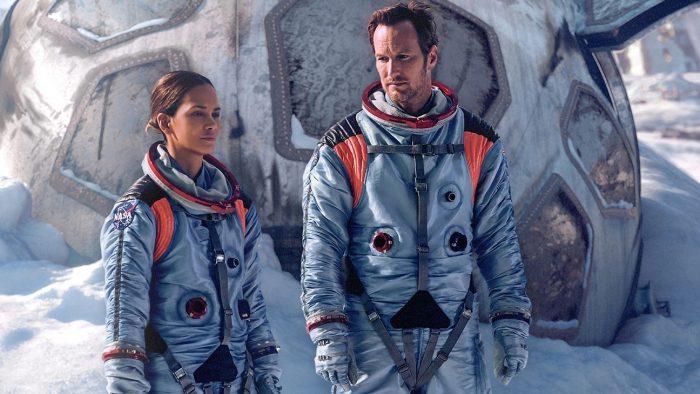By Jeffrey Sanzel
Did you ever stop to think that the “disaster” in “disaster movie” could have two meanings? You’ll have plenty of time to contemplate this during the two-hour running time (one hundred and twenty minutes (twelve thousand seconds)) that Moonfall takes to grind through its machinations.
Roland Emmerich directed, co-wrote, and produced Moonfall. His other science-fiction films include Stargate (1994), Independence Day (1996), Godzilla (1998), The Day After Tomorrow (2004), and Independence Day: Resurgence (2016). So, Emmerich is the guilty party.
On a 2011 Space Shuttle mission, a mysterious black swarm kills an astronaut. A fellow crewmember, Brian Harper (Patrick Wilson), is accused of negligence, blamed for the death, and fired. The other crewmember, Jo Fowler (Halle Berry), was unconscious when the attack occurred.
Fast forward ten years. Harper, now divorced, is on the verge of eviction from his seedy apartment. Fowler (also divorced) holds the position of NASA’s Deputy Director. Conspiracy theorist K.C. Houseman (John Bradley) discovers that the moon’s orbit has shifted, bringing it closer to the earth. Failing to get Harper to listen, he goes public on social media. “Moon panic” and looting ensue. A failed attempt to investigate the moon situation leads to the exposure of the black swarms that attacked ten years earlier.

An hour into the film, Harper, Fowler, and Houseman venture out on a space shuttle taken from a museum; they are off to save the world. Spoiler Alert. In a convoluted explanation, everything comes back to rogue Artificial Intelligence destroying a civilization that colonized earth. The moon is a megastructure built by the aliens. (A fun drinking game would involve imbibing on this oft-repeated word. If you don’t want to wait for the myriad recurrences, say it to yourself ten times before going to the movie and take a nap instead.)
Meanwhile, on earth, a subplot involves Harper’s semi-delinquent son, Sonny (Charlie Plummer), rescuing his mother (Carolina Bartczak) and her new family, as well as Fowler’s son. They are trying to get to a Colorado bunker where Fowler’s ex-husband (Eme Ikwuakor), an Air Force four-star general, is holed up with the keys to the about-to-be-released nuclear weapons. Sonny outdrives a tsunami in an amazing feat of auto-heroics, possibly the greatest plug in Lexus history. He is also involved with a preposterous rescue involving the moon’s gravity saving the day.
Science fiction movies have been built on less but have triumphed in style, special effects, and an appeal to a sense of wonder. Moonfall manages to tick no boxes. What is not CGI looks like cardboard models. The same is true for most of the performances.
Academy Award-winner Halle Berry is truly an exceptional actor and rarely disappoints; here, the headline should be “Halle Berry Cashes a Paycheck.” Patrick Wilson usually does not lack charm, but he comes across as a low-rent Captain Kirk meets Hans Solo.
John Bradley (best known for his role as Samwell Tarly in Game of Thrones)gives the most interesting performance as the backward Houseman (attached to his mother and his cat Fuzz Aldrin). But, today, something is disturbing in the conspiracy theorist as the voice of reason. Donald Sutherland’s minute-and-a-half of screen time is a minute-and-a-half of screen time. (Beneath Berry’s headline should be “So does Donald Sutherland.”) Often, the performances seem one beat away from Airplane. We wait for Wilson to turn to the other two and say, “And don’t call me Shirley.” Alas, he does not.
Movies like this can be entertaining. Unfortunately, Moonfall is not so much fun as unintentionally funny. With lines as painful as “I work for the American people,” “The sand on the hourglass is dropping quickly for all of us,” “I hope the moon holds together at least for a little while,” “I didn’t come this far to fail,” “I hate to tell you this, but we’re running out of time,” and (multiple times) “I’ve got a plan,” the script is cobbled together from The Big Book of Movie Cliches. A personal favorite is “If the earth gets a second chance, I think we deserve one too.” The pseudo-scientific jargon does not help the situation.
Moonfall makes us yearn for the integrity of Georges Méliès’ A Trip to the Moon (1902), in which a cannon propelled capsule lands in the eye of an annoyed moon.
No words can truly describe the Moonfall’s final moments. They must be seen to be believed. Or better, not. Among the film’s promotional taglines is “Earth … We have a problem.” Yup. With deep gravitas, Harper says, “Save the moon. Save the earth.” Perhaps it should have been, “Save your money.”
Rated PG-13, Moonfall is now playing in local theaters.





